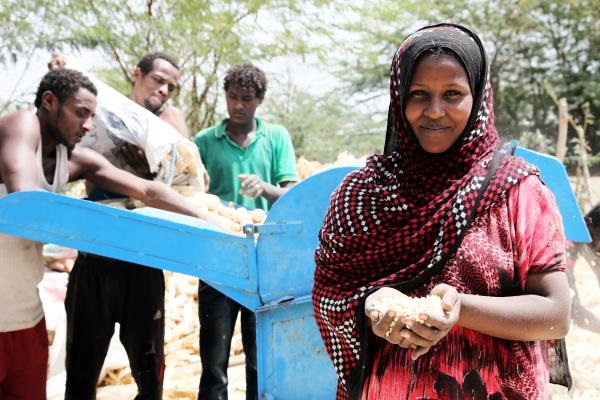
29 April 2016, Rome - With just six weeks left before the start of the main cropping season in Ethiopia, FAO is calling for urgent funding to help farmers sow their fields and prevent drought-hit areas of the country from falling deeper into hunger and food insecurity. If seeds are not delivered in time, help will be too late to secure a decent harvest from the imminent meher season, which produces 85 percent of the nation's food supply, the UN agency said today.
Yet while the food security situation is worsening, the overall funding response to the crisis has so far been disappointing, with just 15 percent of FAO's 2016 appeal for Ethiopia covered.
"The meher season will be critical to improving families' food security and self-sufficiency in 2016. Seed distributions allowing farmers to plant crops and produce food must be a humanitarian priority," said the agency's country representative Amadou Allahoury Diallo. Decreasing dependence on external humanitarian assistance, he continued, will diminish the costs of food aid.
Some $10 million is needed by FAO within the next two weeks to distribute seeds to Ethiopian families at risk of hunger and losing their livelihoods. About 10.2 million people in Ethiopia are food insecure following successive crop failures and widespread livestock deaths caused by the El Niño-induced drought since early 2015. With this year's delayed and erratic spring rains, the situation may become worse in the most affected areas, particularly in the north.
Ethiopia's government has already dedicated considerable resources to the El Niño response and is working closely with FAO to help ramp up joint efforts.
Underserved districts
Nearly a third of all districts in the country - some 224 - are now severely food insecure. That number is some 20 percent higher than just three months ago.
Recent estimates by Ethiopia's Bureau of Agriculture indicate that some 1.7 million farming families are seed insecure, meaning they do not have the inputs required to plant in the meher season, which starts as early as mid-June for some crops, with planting ongoing until August for others.
More than 90 districts are currently not receiving any kind of emergency seed support or are insufficiently covered, according to FAO Surge Response Team Leader Pierre Vauthier. "It's these forgotten districts that FAO is targeting -- but without immediate funding support, some 150,000 households will miss their best chance of growing food to bring them through the year," he said.
Depleted seed reserves
For many households, seed reserves are extremely depleted following unsuccessful planting and re-planting in 2015, while families in the most affected areas have been forced to consume their seeds as food.
As a result of the poor 2015 harvest, farmers' income has been reduced and purchasing power constrained, further limiting their ability to buy the seeds and inputs they need to produce staple crops like maize, sorghum, teff, wheat, and root crops.
Because the spring rains were initially erratic and delayed, even those farmers who had seeds may not have planted enough to meet their household's needs, especially in the north.
A good meher season will improve food availability nationwide and enhance access to food and reduce reliance on external humanitarian assistance in the medium term.
FAO's response to El Niño
This year, FAO, together with the government and partners, has already distributed seed and planting materials for maize, sweet potato, Irish potato and vegetables in some of the most affected areas and continues to support livestock herders with distributions of survival animal feed. FAO is also helping farmers produce fodder and improve access to water for livestock. Herds across the country have also benefited from vaccination and treatment campaigns to address their increasing vulnerability to disease as a result of drought.
"A failure to deliver seed aid now will almost certainly mean a failure of the meher season for the most vulnerable, with dire consequences for food security. If we are to make a difference, the funds need to come in and they need to come in now," said Allahoury Diallo.